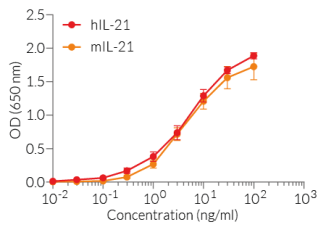HEK-Blue™ IL-21 Cells
-
Cat.code:
hkb-il21
- Documents
ABOUT
IL-21 responsive STAT3-SEAP reporter assay
HEK-Blue™ IL-21 cells are designed to monitor interleukin 21 (IL-21)-induced STAT3 stimulation or inhibition. This colorimetric bioassay can be used for screening activatory molecules, such as engineered cytokines, or inhibitory molecules, such as neutralizing antibodies.
HEK-Blue™ IL-21 cells respond specifically to recombinant human IL-21 and mouse IL-21. The reliable and consistent performance of HEK-Blue™ IL-21 cells makes them suitable for release assays of therapeutic molecules that inhibit IL-21 signaling, such as Avizakimab, a monoclonal antibody targeting IL-21 (see figures).
Key features
- Readily assessable STAT3-SEAP reporter activity
- Convenient readout using QUANTI-Blue™ Solution
- High sensitivity to human (h) IL-21 and mouse (m) IL-21 activity
- Stability guaranteed for 20 passages
Applications
- Therapeutic development
- Drug screening
- Release assay
Interleukin 21 (IL-21) is a secreted cytokine that plays an essential role in promoting the proliferation and development of T cell subsets, as well as inducing B cell generation and differentiation into plasma cells.
Disclaimer: These cells are for internal research use only and are covered by a Limited Use License (See Terms and Conditions). Additional rights may be available.
SPECIFICATIONS
Specifications
IL-21
Human, Mouse
Detection and quantification of IL-21 activity
1 - 100 ng/ml (hIL-21 and mIL-21)
Complete DMEM (see TDS)
Verified using Plasmotest™
Each lot is functionally tested and validated.
CONTENTS
Contents
-
Product:HEK-Blue™ IL-21 Cells
-
Cat code:hkb-il21
-
Quantity:3-7 x 10^6 cells
- 2 x 1 ml HEK-Blue™ Selection (250X concentrate)
- 1 ml of Puromycin (10 mg/ml)
- 1 ml Normocin® (50 mg/ml)
- 1 ml of QB reagent and 1 ml of QB buffer (sufficient to prepare 100 ml of QUANTI-Blue™ Solution, a SEAP detection reagent)
Shipping & Storage
- Shipping method: Dry ice
- Liquid nitrogen vapor
- Upon receipt, store immediately in liquid nitrogen vapor. Do not store cell vials at -80°C.
Storage:
Caution:
Details
Cell line description
HEK-Blue™ IL-21 cells were generated by stable transfection with the genes encoding the IL-21Rα and IL-2Rγ chains of human IL-21 receptor, JAK3, STAT3, and a STAT3-inducible secreted embryonic alkaline phosphatase (SEAP) reporter. The binding of IL-21 to its receptor triggers a signaling cascade leading to the activation of STAT3 and the subsequent production of SEAP. This can be readily assessed in the supernatant using QUANTI-Blue™ Solution, a SEAP detection reagent.
HEK-Blue™ IL-21 cells detect human (h) and murine (m) IL-21. Of note, they also respond to hIFN-α and hIFN-β, but not hIFN-γ (see figures).
IL-21 background
Interleukin 21 (IL-21) is a cytokine mainly produced by CD4+ T cells and natural killer T (NKT) cells. It has pleiotropic actions on a wide range of immune (i.e. lymphoid and myeloid populations) and non-immune cell types (i.e. epithelial cells) [1,2]. IL-21 belongs to the common γ chain cytokine family. Its receptor comprises the IL-21Rα (CD360) and IL-2Rγ (CD132) chains and it signals through tyrosine kinases of the Janus family (JAK1 and JAK3) and signal transducer and transcription activators (STAT). STAT3 plays a major role in the biological actions of IL-21, and some functions have been also attributed and suggested for STAT1 and STAT5, respectively [1-3]. Furthermore, IL-21 facilitates the PI3K/AKT and MAPK pathways, which both contribute to IL-21 signal transmission [1-3]. IL-21 is referred to as a double-edged sword cytokine, with key roles in anti-tumor and anti-viral responses, but also in promoting the development of autoimmune diseases (e.g. systemic lupus erythematosus and rheumatoid arthritis) [1-3]. Recombinant IL-21 as well as anti-IL-21 monoclonal antibodies are being investigated for therapeutic use in cancer and autoimmune diseases [1-3].
1. Spolski R. et al., 2014. Interleukin-21: a double-edged sword with therapeutic potential. Nat Rev Drug Discov. 13(5):379-95.
2. Leonard WJ. et al., 2016. IL-21 signaling in immunity. F1000Res. doi: 10.12688/f1000research.7634.1.
3. Long D. et al., 2019. Clinical significance and immunobiology of IL-21 in autoimmunity. J Autoimmunity. 99:1-14.
DOCUMENTS
Documents
Technical Data Sheet
Validation Data Sheet
Safety Data Sheet
Certificate of analysis
Need a CoA ?






